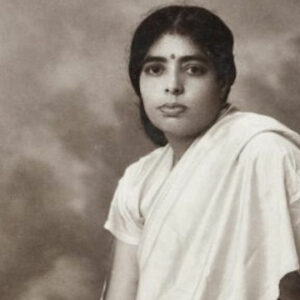Janaki Ammal Edavaleth Kakkat was an Indian botanist whose work on sugarcane and eggplant is particularly well-known. While in England, she conducted a study on chromosome counts and ploidy in a variety of garden plants, which resulted in fresh insights into the evolution of species and varieties. Her research contributed significantly to our understanding of sugarcane polyploidy and aided in the selection of plant varieties for cross-breeding in order to create the sweetest sugarcane. Born in late nineteenth-century Kerala, India, Ammal was encouraged from an early age to pursue her scholarly pursuits. Unlike many other Indian households during that era, where girls were denied opportunities for self-development, her family encouraged her from the start. She had an early interest in botany and attended Queen Mary’s College and Presidency College to study the topic. Eventually, she developed an interest in cytogenetics and enrolled in graduate studies at the University of Michigan in the United States. After completing her studies and working as a professor for a time, she accepted a position as a geneticist at the Sugarcane Breeding Institute in Coimbatore. She was a strong-willed woman who never married and devoted her entire life to scientific endeavors.
Childhood & Adolescence
Janaki Ammal was born on 4 November 1897 in Tellicherry, Kerala, India, into a large family. Her father, Dewan Bahadur Edavalath Kakkat Krishnan, was a Madras Presidency sub-judge. She was the youngest of six brothers and five sisters.
She grew up in a period when the majority of Indian girls were not educated and women were discouraged from pursuing professional interests. Her family, on the other hand, was progressive, and Janaki was encouraged to pursue intellectual endeavors.
Early on, she had an interest in botany. She moved to Madras after completing her education and earning a Bachelor’s degree from Queen Mary’s College. In 1921, she earned a B.Sc. with honors from Presidency College. During her tenure as President, she developed an interest in cytogenetics.
As an excellent student, she was awarded a scholarship at the University of Michigan in the United States, where she got her master’s degree in 1925.
She moved to India briefly to teach at the Women’s Christian College before returning to Michigan as the inaugural Oriental Barbour Fellow. In 1931, she earned her D.Sc.
Janaki Ammal’s Career
In 1932, she went to India and was appointed Professor of Botany at Maharaja’s College of Science in Trivandrum.
In 1934, she began working as a geneticist at the Sugarcane Breeding Institute in Coimbatore. The institute was established with the goal of enhancing the sugarcane plant in India. Ammal worked at the institute with T.S. Venkataraman, who had successfully boosted the country’s sugarcane production in recent years.
Ammal’s polyploidy studies aided in the understanding of the nature of polyploidy in sugarcane. She was instrumental in establishing a sound scientific foundation for cross-breeding and hybridization, as well as assisting in the selection of plant kinds for cross-breeding. She remained employed at the institute until 1939.
In 1940, she relocated to England to work as an Assistant Cytologist at London’s John Innes Horticultural Institution. There she conducted chromosome studies on a variety of garden plants, and her work on chromosome counts and ploidy resulted in significant important advances in the study of species and variety evolution.
From 1945 until 1951, she worked as a cytologist at the Royal Horticultural Society in Wisley. Jawaharlal Nehru, India’s Prime Minister, urged her to return to her birthplace in 1951 to assist in restructuring the Botanical Survey of India (BSI).
She joined the BSI in 1952 as an Officer on Special Duty and eventually became Director-General. She then served the Government of India in a variety of other roles, including as director of the Central Botanical Laboratory in Allahabad.
She spent the last portion of her career at the Bhabha Atomic Research Centre in Trombay before relocating to Madras in 1970, when she was declared an Emeritus Scientist at the University of Madras’ Centre for Advanced Study in Botany.
Her Significant Works
Janaki Ammal was a pioneer in India’s cytogenetics area, and she made a significant contribution to the production of sweeter hybrid sugarcane types. She was instrumental in not only evaluating the geographical distribution of sugarcane in India but also in selecting the best kinds for cross-breeding as a member of the Sugarcane Breeding Institute.
Awards and Accomplishments
Ammal was named a Fellow of the Indian Academy of Sciences by Professor C.V. Raman in 1935, and she was elected a Fellow of the Indian National Science Academy in 1957.
In 1956, she was awarded an honorary LL.D. by the University of Michigan.
In 1977, the Government of India bestowed upon her the Padma Shri.
Personal History and Legacies
Janaki Ammal was a very straightforward person in terms of her lifestyle. She was constantly clothed in traditional Indian garb and possessed little worldly possessions. She lived a Gandhian lifestyle and was well regarded for her dedication to moral and ethical values. She was never married nor did she have children.
She lived to be a ripe old age and was not known to have suffered from any significant ailments. In February 1984, she died of natural causes at the age of 87.
Estimated Net worth
Unknown.


